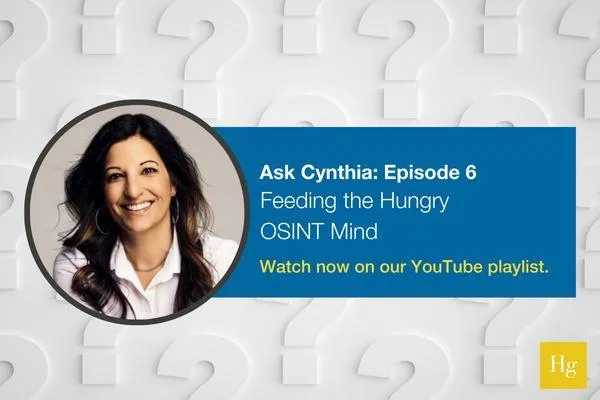
Ask Cynthia: Feeding the Hungry OSINT Mind
In this series, OSINT professionals ask Cynthia their most pressing questions regarding open-source intelligence. Cynthia provides candid answers with some professional feedback to help professionals develop their tradecraft.
Problem: A new OSINT professional just graduated the OSINT Academy's Foundations of OSINT 8-week program. He's insatiably curious and eager to grow his open-source intelligence skills.
He asked, “What resources do you recommend for someone to increase their knowledge of geopolitical events?”
Response: Pardon me while I tighten the bun on my head and sharpen my pencil. You just engaged my librarian muscles. Here comes some required reading.
Before I start rattling off book titles and news sources, let’s zoom out. This isn’t just a question about resources, it’s about how to learn as much as what to learn. And in OSINT, one of the most critical skills is being able to engage with opposing viewpoints without losing your footing. In other words, whether you like the green M&M’s or red Twizzlers, it’s not important to answer this question. How can you get your patron (student, learner, new OSINT professional - really, anyone) to understand there are always opposing viewpoints, and that you can leverage them to be a more discerning customer.
Remember the ancient Greeks? They didn’t scroll through Twitter. They took their arguments to the agora. They debated. They clashed ideas. And in doing so, they sharpened their reasoning. We’ve lost a bit of that in today’s echo-chamber media landscape. Everyone’s broadcasting; no one is listening and then arguing, not in a constructive way, anyway.
And don’t get me started on how far today’s Stoics have wandered from what Diogenes (Laertius, not Sinope) intended. The father of Stoicism wasn’t about detachment for the sake of memes, he was about clarity, virtue, and thought rigor. That’s what we need more of as intelligence professionals.
Recommended Reading for OSINT and Geopolitical Research
These recommendations aren’t geopolitical updates, but a cognitive bootcamp. They will help shape how you think, just as important as knowing what’s going on.
The Stoics. F.H. Sandbach. (1994). ISBN: 978-0872202535
The Lives & Opinions of the Stoics. Diogenes Laertes & C.D. Yonge. (2021). ISBN: 979-8594764439
There is nothing new, but just more pronounced, differing opinions. This is what makes us a richer and wiser community. Check out Opposing Viewpoints by Greenhaven publishing, which you may have been subjected to as a high school student. Topics like abortion and climate change were always the social studies class assignment. This is how students learn to vet sources, defend positions, and expand perspective. Sound familiar? That’s OSINT in action.
What am I Reading and Learning from Today?
I like a broad swath of news. Three papers hit my doorstep:
My local county newspaper
Online, I rotate through:
Financial Times (when I can get it)
Intelligence Online (expensive but worthy)
With literature, it’s important to try and get newspapers, or feeds, that aren’t published in your country, or geo-location, alone. This gives you perspectives from different backgrounds.
What am I Watching?
Honestly, it’s slim pickings if you’re looking for just the facts on U.S. television. Still, I watch a cross-section of networks to get a feel for the narrative slants. Sometimes I even tune in to opinion shows or parodies (hello, Gutfeld) not necessarily because I agree, but because I want to know what people are absorbing. I also think Tyrus might be a Stoic philosopher in disguise, decked out in sweats and swagger.
What Cynthia's episode on our Youtube channel too.

